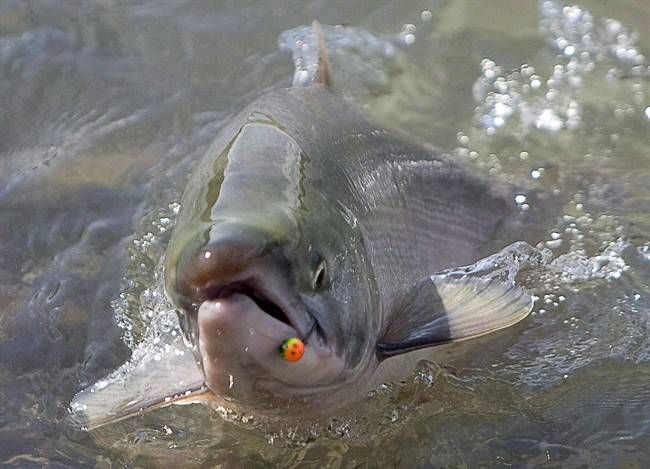VANCOUVER – Late summer can be “sockeye crazy” in British Columbia’s rivers, but one fish expert says this year’s salmon season seems to be non-existent.

Low river flows and hot water temperatures likely combined to create poor conditions for the annual sockeye migration, said Ken Ashley, director of the Rivers Institute at the B.C. Institute of Technology.
But because the weather has cooled in recent days, warm water that’s often lethal to returning salmon has become more hospitable, said the Department of Fisheries and Oceans Wednesday.
“I didn’t smoke or can anything this year,” Ashley said.
“So I’m looking at last year’s salmon that I canned and was thinking, ‘Thank god I bought a bunch of Adams River fish last year and I have enough to bring me through a second year.’ Yeah, it was that quiet.”
The Fisheries Department has predicted a meagre 1.5-million sockeye are due to reach spawning grounds in B.C. over the coming weeks.
Last year’s sockeye season was considered a banner year, returning nearly 21-million fish to the Fraser River. Scientists had also pegged 2014 as the one-in-four “dominant” year of the Adams River sockeye cycle.
Fisheries area director Stu Cartwright said 2015’s number appears to be “considerably lower” than biologists would prefer.
“We aren’t seeing the abundance that we’d like to be seeing, for sure. And that is a concern,” he said.
This year’s Adams River season was automatically deemed a “subdominant” year, in which the typical pattern would return only about five per cent of the previous year, said Ashley. Forecasts for the next two year are even more dismal, at one per cent returns from 2014 season.
Ashley said that even when the Adams River run is low, sockeye runs from other lakes often push up the overall return. That doesn’t seem to be the case so far this year, he said.
“Normally, some of the other fish lakes are not all dominant in the same year. It’s like having a blended stock portfolio,” he said. “It averages out.”
Even while the Fisheries Department is nervous over the potential for fewer fish, there is some relief that water temperatures in the Fraser are slowly dropping.
The temperatures have decreased to around 15 C or 16 C, an acceptable range crucial for fish health, Cartwright said.
He added the department believes anticipated returns of chinook salmon will be stronger.
Cartwright has also praised B.C. residents who continue to voluntarily cut water consumption. He noted that water flow in the Fraser River system remains below normal, increasing pressure on returning salmon.
(The Canadian Press, CHNL)



Comments